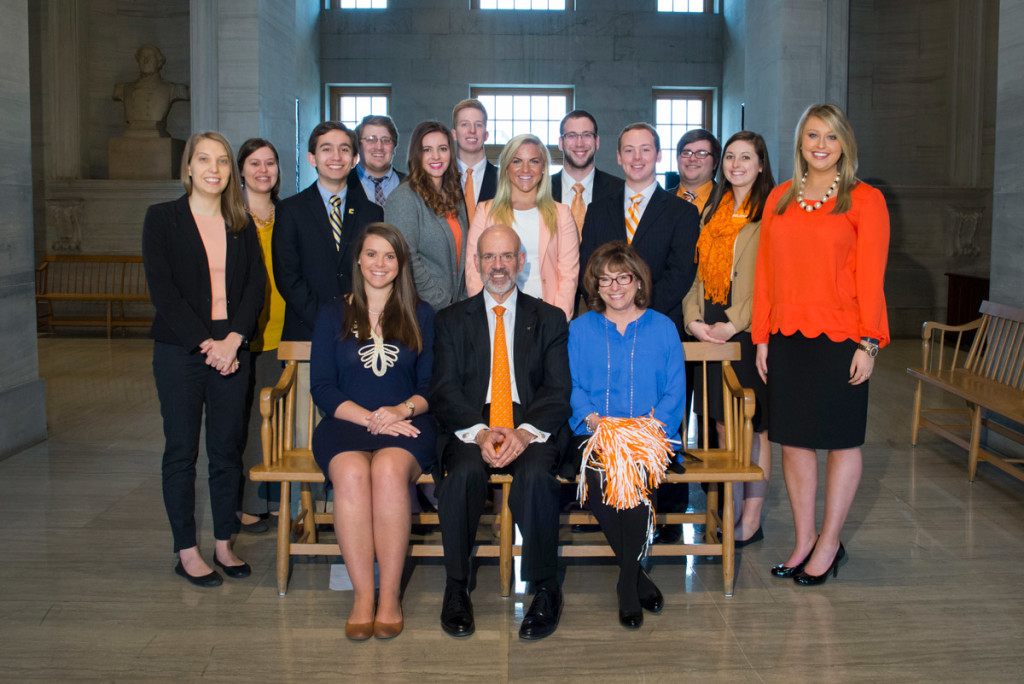 Photo by Adam Brimer
Photo by Adam Brimer
KNOXVILLE –The outcome of the state’s 2015 budget was favorable to the University of Tennessee and higher education, and each project or initiative funded is an investment in the state’s future, says UT President Joe DiPietro.
Among UT’s top budget requests that were funded: a new West Tennessee 4-H Center, a new science building for UT Knoxville, pay raises for employees, and full funding of the state’s higher education productivity gains.
Full funding of the productivity gains, in accordance with the Complete College Tennessee Act of 2010, which established a performance-based approach, will result in a $9.7 million increase in recurring operating funds for UT, DiPietro said.
Also funded was a $1 million request to build a new, advanced wind tunnel at the UT Space Institute in Tullahoma. This facility will be only the second of its kind in North America, and it will enable scientists there to conduct research at the forefront of one of the U.S. Department of Energy’s and the U.S. Air Force’s emerging research priorities.
An appropriation of $27.3 million in capital maintenance funding across all UT entities will enable needed upgrades for facility compliance with the federal Americans with Disabilities Act, fire safety, electrical distribution system efficiencies, building security improvements and roof replacements.

“For the past year, I’ve been making the case for increased legislative support for higher education, and I’m grateful that the governor and legislature have responded by providing strong fiscal support this year,” DiPietro said. “Funding these requests demonstrates the state’s recognition that higher education is a critical component of our state’s future.”
Funding for the new 4-H center will provide West Tennessee youth access to an interactive environment to learn about science, natural resources and agriculture. The UT Knoxville science building will increase the campus’ capacity to educate students and produce groundbreaking research.
“It’s because of our faculty and staff that we’re able to educate record numbers of students, create groundbreaking research and reach out to all 95 counties with health, agricultural and consulting services,”
Increased funding for the UT Institute of Agriculture, UT Institute for Public Service and UT Health Science Center will enhance each entity’s capacity to serve all Tennesseans. In 2013, these institutions provided a combined outreach to more than 6 million people statewide.
Pay raises for UT employees that were approved and will be partially funded by the legislature will help address a nearly $150 million market gap in employee pay.
“It’s because of our faculty and staff that we’re able to educate record numbers of students, create groundbreaking research and reach out to all 95 counties with health, agricultural and consulting services,” DiPietro said. “I’m proud of the work carried out by our employees, and they deserve to be paid fairly and competitively for their contributions.”
While higher education saw greater state support in the budget approved this year than in recent years, DiPietro said a projected funding gap of more than $377 million over the next 10 years remains a threat he is working to address.
“A year ago, I told our board that our business model was broken, and that we could not continue operating in the same manner,” DiPietro said. “We have taken ownership of this problem, and I am committed to ensuring we use our resources—including state dollars—in the most efficient and effective manner possible, even as we seek to establish sustainable, long-term funding to ensure the University of Tennessee continues to fulfill its mission for the good of all Tennesseans for generations to come.”
DiPietro plans to reveal next steps in his push toward a sustainable funding model for the University at the annual meeting of the UT Board of Trustees on June 24-25 in Knoxville.
“Four years from now, we’ll be a different University,” DiPietro said. “We’ll increase our capacity to educate students, produce research and provide outreach, and we’ll do all of that at a higher level of excellence by being more entrepreneurial and efficient.
“We can’t become a better resource for the state entirely on our own, however. We will need an even stronger partnership with the governor and legislature to improve the lives of all Tennesseans.”
Contacts
Elizabeth Daviselizabeth.davis@tennessee.edu
(865) 974-5179
Erica Jenkins
ejenkins@tennessee.edu
(865) 974-4211
